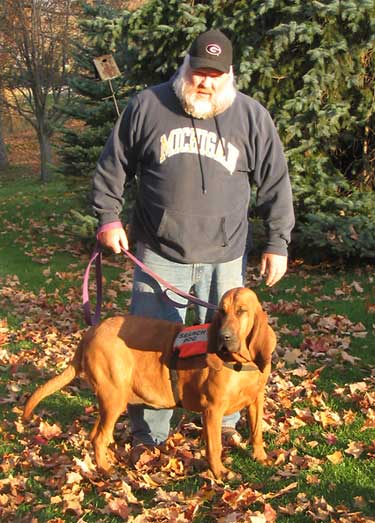A typical day for Dave Wilson begins at 4 a.m., when he wakes up to let his dogs out.

Wilson is an outside plant foreman at the University, a job that requires him to be in the office by 5:30 a.m. so he can install, repair, maintain and work to prevent damage on the Information Technology Central Services plant that provides voice, data and video services for all three U-M campuses. The other reason he gets up before dawn is for his three 125-pound search-and-rescue bloodhounds.
He and wife, Libby, share a home in Munith with Magnolia Star, Ruby Begonia Star and Cora Belle Star, who “slobber on everything” but are gentle and loving animals. Maggie, Ruby and Cora, however, are not ordinary pets with skills that peak at “sit” and “fetch.” For the past five years, Wilson has been training his dogs to become experts at trailing missing people and criminals.
Wilson met his training partners Ken and Shirley Koch a few years ago in Ann Arbor; they have raised and trained bloodhounds for years.
“I met them through some mutual friends after I got Maggie,” Wilson says. “I’m sure that I must drive them nuts. I’m always calling, seeing if they want to go out and play.”
For Wilson and his hounds, playing involves going anywhere and everywhere, from farms to locations around campus, and hiding from the dogs in obscure places.
“One person will go hide and whoever shows up last tries to find him with the dogs,” he says.
They train in all weather conditions and in all the ways a person can go missing.
“We train on weekends, on some nights, in hot or cold, wet or dry weather,” Wilson says. “We try to expose them to all situations, including arson and cadavers. I make time every day to do something with all the dogs, as they are highly intelligent and crave attention.”
Bloodhounds traditionally are used in the South to find missing people; kennels that breed the dogs in the North come far and few between, but Wilson is starting to garner more calls that put his dogs to work.
German shepherds traditionally are the all-around police dogs of choice, as bloodhounds are less aggressive and are not likely to defend themselves when faced with a criminal. However, bloodhounds have a keen sense of smell second to no other breed, are fast runners and love tracking people, making them ideal resources whenever someone is missing.
Wilson’s dogs can even find someone trapped in a car across several lanes of traffic.
“I got into this for the kids,” he says. “I can’t imagine a parent with a lost child out there. I’ve got a lot of money and time invested in these dogs, but if I find even one missing child, it will all have been worth every cent.”
Wilson is associated with the Henrietta Township Fire Search & Rescue and is on call with the Waterloo Township Police Department. In a recent case he and Maggie—his most experienced dog—were able to determine that a missing child did not run away as his parents claimed.
Just by smelling the skin cells swabbed from the bed of the boy, who supposedly had climbed out his window, Maggie verified that fresher skin cells could not be found on the porch outside his window, lending support to the prosecutor’s contention that foul play had occurred. In the recent court case, the boy’s father pleaded guilty to second-degree murder in exchange for his testimony against the mother.
Wilson and the dogs demonstrate their skills free of charge at various locales, including Domino’s Farms, Washtenaw Community College, Michigan United Conservation Clubs’ Outdoorama in Novi and at schools and several summer camps.
“Our most memorable demonstration was at a muscular dystrophy camp in Port Huron,” Wilson says. “The kids were absolutely amazed at what the dogs can do.”

